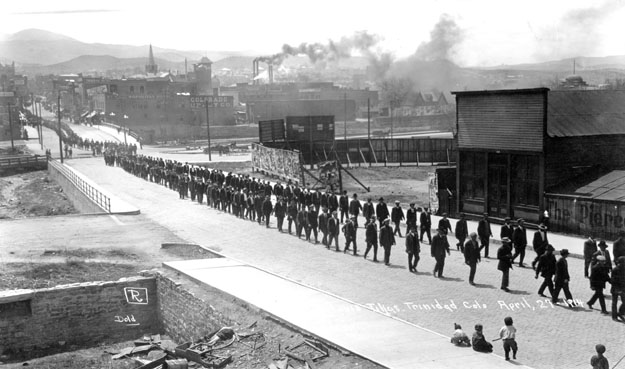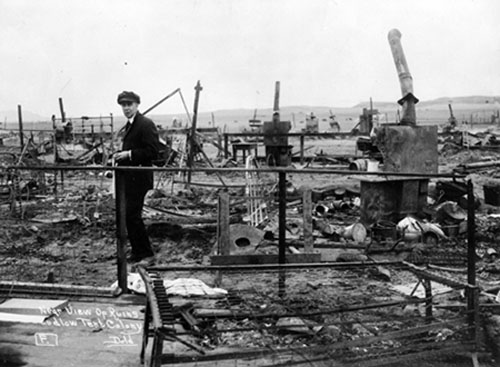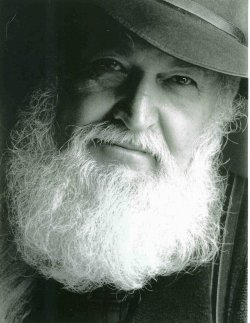Zack Exley’s Preaching Revolution, which recently appeared in In These Times, is fascinating, and frustrating. The article’s about a diffuse set of Evangelical Christian mega-churches, which have begun to preach nonviolence, opposition to war and imperialism, solidarity with and aid to the poor, the need for radical societal change, and opposition to the theocratic power-grabs of the Religious Right. The leaders of these churches consider themselves revolutionaries, and aim to restore the radicalism that they see in Jesus’s mission and primitive Christianity. The churches, like the conservative mega-churches, are large, well-organized, well-heeled, and technologically sophisticated. Exley thinks that they are an emergent movement that could have a dramatic effect on both Evangelical Christianity and American politics; he also suggests that the secular Left has a lot to learn from them.
In his book Irresistible Revolution, 30-year-old author Shane Claiborne,
who is currently living in Iraq to stand in the way of war,
asks evangelicals
why their literal reading of the Bible doesn't lead them to do what Jesus so clearly
told wealthy and middle-class people to do in his day: give up everything to help
others.
The popular evangelical Christian magazine Relevant, launched in 2003
by Cameron Strang, the son of a Christian publishing magnate, contains a
Revolution
section complete with a raised red fist for a logo. They've also
released The Revolution: A Field Manual for Changing Your World, a
compilation by radical, Christian social-justice campaigners from around the world.
Bell and Claiborne are two of the better-known young voices of a broad, explicitly
nonviolent, anti-imperialist and anticapitalist theology that is surging at the heart of
white, suburban Evangelical Christianity. I first saw this movement at a local,
conservative, nondenominational church in North Carolina where the pastor preached
a sermon called Two Fists in the Face of Empire.
Looking further, I found a
movement whose book sales tower over their secular progressive counterparts in
Amazon rankings; whose sermon podcasts reach thousands of listeners each week;
and whose messages, in one form or another, reach millions of churchgoers. Bell
alone preaches to more than 10,000 people every Sunday, with more than 50,000
listening in online.
But this movement is still barely aware of its own existence, and has not chosen a
label for itself. George Barna, who studies trends among Christians for clients such as
the Billy Graham Evangelical Association and Focus on the Family, calls it simply
The Revolution
and its adherents Revolutionaries.
The article does contain a couple of gaffes that seem to come from the ignorance that all too many people on the secular Left still have about the varieties of Christianity. For example, Exley claims that Where Revolutionaries most part ways with many mainstream evangelical churches' interpretation of the Bible is in their embrace of women as leaders, elders and preachers.
This is actually nothing new in American Protestantism, or even in evangelical mega-churches. Southern Baptists, say, have been and mostly still are hostile to women preaching or leading within the church; but the Pentecostal churches have had women participating in ministry and leadership for over a century now. But there’s a lot here to like. Some of the most interesting things in the article have to do with the participatory culture within some of these revolutionary
churches:
If you compare the Mars Hill complex to progressive community centers or union
halls, it has no rival. The entire mall has been converted. Most of the stores are now
classrooms for the different grades of its enormous Sunday school. One of the large
department stores has been converted into an events and youth meeting space with
a stage, and ping pong and pool tables. The broad, carpeted concourse is now filled
with comfy sofas and chairs for sitting and talking. Though the complex is perfectly
clean and attractive, you get the feeling that the church, in renovating the facilities,
has spent the minimum possible resources to meet functional needs.
More striking than the size of Mars Hill is the intensity of participation among the
membership. The Mars Hill house church program — where small numbers of people
come together in a home for Bible study, fellowship, mutual support and as a
launching point for outreach into the community — involves more than 2,000
members in hundreds of groups, each with its own leaders. Several hundred volunteer
as childcare providers and Sunday school teachers. And hundreds more serve each
Sunday as ushers, parking helpers and medics. (With 3,500 people in a room, you
never know what can happen.)
Yet Mars Hill is not atypical. According to the Barna Group, nine percent of Americans
attend house churches (up from one percent 10 years ago). And tens of thousands
of churches are de facto community centers, serving and supporting virtually all
aspects of their members' lives, usually with a significant percentage of members
acting as volunteers. In this way, churches have left progressives in the dust in
terms of serving and engaging people directly. The union hall is the left’s nearest
equivalent, but not only is it dying, it rarely attempts to serve anywhere near as
many of the needs — spiritual and practical — as churches do.
…
At the Isn't She Beautiful
conference, the non-theological sessions were
devoted to one of the secrets of this movement's success: leaders — identifying
them, recruiting them, loving them
and letting them lead. The pastors at the
conference all seemed to view their church memberships as seas of under-utilized
leaders, and spent as much time as they could learning from each other and the Mars
Hill staff how to be the best fishers of men
they believe Jesus called them to
be.
This high-density leadership organizing model stands in stark contrast to anything
I've ever seen working in unions, progressive organizations and Democratic political
campaigns. On the left, recruiting and mobilizing leaders has become devalued work
that is typically left to inexperienced recent college graduates. The pastors at this
conference, however, saw recruiting and inspiring leaders as one of their central
callings. Too often, the left pays lip service to the grassroots, but lacks faith in
grassroots leaders. The result is that too many of our organizations are one person
deep and stretched impossibly thin. At the conference, I tried to imagine what Kerry
campaign field offices (where I spent a lot of time in 2004) would have looked like if
we had recruited leaders instead of bodies
and expected them to be
faithful, committed members of a team
(words included in Mars Hill volunteer
job descriptions). Some organizations on the left do include leadership
development
in their organizing models. But churches seem to assume that there
are already plenty of developed
leaders in their midst and go straight to
giving them as much responsibility as they can.
We could use a bit more history here. The union hall is dying, now; but that’s only one of the visible remnants of what used to be a much larger, and much more vibrant, labor culture. Before the New Deal, when political patronage, political control, and professionalized bureaucracy combined to create a long, slow managerial stranglehold on rank-and-file unionism, the labor movement was much more than meetings at the union hall and negotiations in the board room. The radical wing of the labor movement, in particular–and these were, for what it’s worth, mostly anarchists–created and sustained a flourishing counterculture, which included not only the union hall, but also reading groups, schools for children, mutual aid societies, banquets, dances, newspapers, songs, stories, cartoons, posters, murals, and more, all organized by workers who unionized with the slogan We are all leaders here.
If the radical labor culture can’t hold a candle to what these radical churches now offer, that is because of what the labor movement has become in the era of state-capitalist unionism, and indeed precisely because of the vacuums created by the collapse of labor radicalism in American culture.
What I want to focus on right now, though, is how Exley has missed out on one of the most important lessons that Mars Hill and other revolutionary
churches have incorporated into both their preaching and their works. The failure comes out when he turns to speculate on where the revolutionaries’ strategy for social change might lead in the near future:
Andrew Richards is the local outreach pastor
at Mars Hill, charged with
driving the Mars Hill house church program to reach people in need in the greater
Grand Rapids community. We're not only taking care of the needs of our own
community, but we want to respond to the needs that are in the greater
community,
he said before a recent Sunday service while trying to recruit more
leaders. He laid out five areas of focus: urban at-risk youth, refugees, poverty,
community development and HIV/AIDS.
Rob Bell and other church leaders seem to be building up to a big challenge. It is
unclear exactly what is in the works. (Bell does not give interviews.) But he has been
preaching more and more about systemic oppression,
poverty, debt and
disease — not just locally but globally. And other leaders have indicated to the
membership that the current level of sacrifice for others in the community and the
world is not in line with Jesus’ teachings.
On Dec. 10, 2006, Bell kicked off a series of sermons, titled Calling all
Peacemakers,
during which he said:
Never before in history have there been a group of people as resourced as us. …
Never before has there been a group of people who could look at the most pressing
needs of the world and think: well, we could do it … History is like sitting right
there, in the middle of war, and great expenditure, and violence, and the world torn
apart in a thousand directions — [waiting for] a whole ground swell of people to
say, Well, we could, we could, we could do this. We could do what Jesus said
to do.
But, as of now, the Revolutionaries seem to be embracing person-to-person,
be the alternative
solutions to the exclusion of advocating for social
policy that is more in line with their vision of the kingdom. Boyd says, I never
see Jesus trying to resolve any of Caesar's problems.
Wallis believes this reluctance comes from the recent experience of being dragged
into the mess of partisan politics on the terms of the Republican party.
… But where will their prayers lead them? Will they forever restrict themselves to
person-to-person, relational
solutions? Or will they choose to influence
political leaders on issues they share with the left — poverty, war, environmental
destruction — with the same force that the Christian Right exerted around abortion,
gay marriage and other areas?
There is something important here that Exley does not seem to grasp, but his subjects do. Social policy,
i.e., government making and executing laws, is not something that happens over and above person-to-person,
relational
solutions like direct action and person-to-person mutual aid. Governments are made of people, no less than churches are. When governments make laws, there’s no magical zap or mystical assumption that elevates the policy beyond the limited, work-a-day efforts with which ordinary people muddle through. There is only one group of mortal human beings writing down general orders, another much larger group choosing whether to follow those orders or ignore them, and a third group that tries to make the second group follow the orders from the first, by force if necessary. The demands might be just or unjust; the enforcement may be appropriate or inappropriate. But whatever they are, they are just human words and human deeds like any others.
So the question isn’t, actually, whether Christian revolutionaries should aim at person-to-person solutions or else advocating for social policy.
Person-to-person solutions are the only solutions there are, and government-enforced social policy is just one more form of relational solution amongst many. The right question to ask is: what sort of personal relationships we should cultivate, between whom, with what structures and in what roles? Should our solutions to outstanding social problems come from person-to-person relationships between equals, based on spontaneous human concern and practiced with mutual consent? Or should they come from person-to-person relationships between government authorities and ordinary civilians, based on political lobbying and backed up by legal force? Should the people working to make a social change carry sandwiches and soup, or guns and handcuffs? Caesar has one answer; the revolutionary Christians have another. And I happen to think that Caesar is wrong and they are right. Whatever short-run gains you might be able to extract by getting into governmental politics and enlisting State power on your behalf, it comes at the strategic cost of making your movement dependent on the good graces of a privileged political elite, and at the moral cost of staining a just cause with coercive means.
But that answer will remain incomprehensible until we have first asked the right question, and Exley and Wallis–like all too many people in the so-called Progressive
wing of the Left–have failed to understand it, and so failed to understand those (like the Christian revolutionaries
that Exley intends to profile) who put it at the center of their concerns. It’s not about timidity or skittishness or the machinations of the Moral Majority; it’s about having a set of ideals about how you should deal with your fellow creatures and build a community with them. Judging from the views they express in the article, there are a lot of things I’d agree with the revolutionary Christians on; and a lot of other things I’d disagree with them on. But this is definitely something that they see correctly, even if only through a glass darkly, and I can only hope that Leftists like Exley will one day learn the same lesson.
Further reading:
 From the Brickbats column for the most recent issue of Reason (June 2008, p. 11):
From the Brickbats column for the most recent issue of Reason (June 2008, p. 11):

 Sad news to report today.
Sad news to report today.